#Paul Weyrich
Explore tagged Tumblr posts
Text
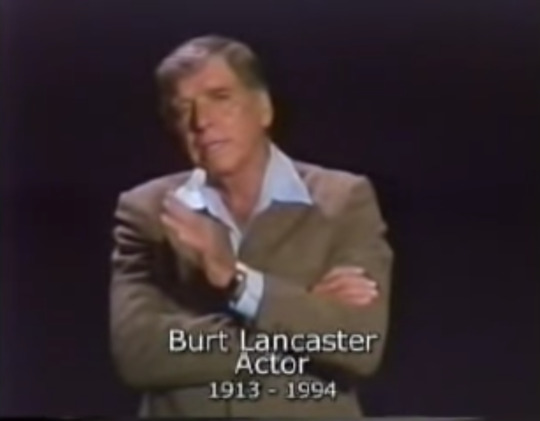
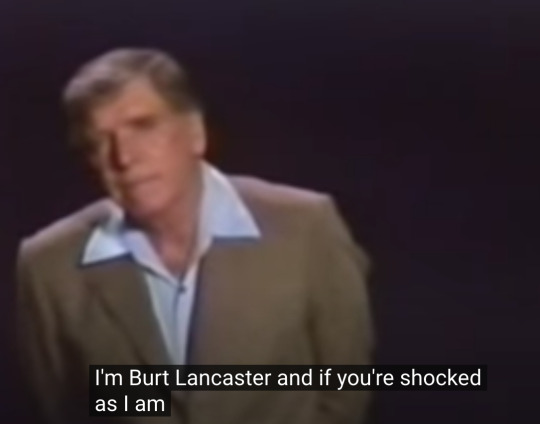

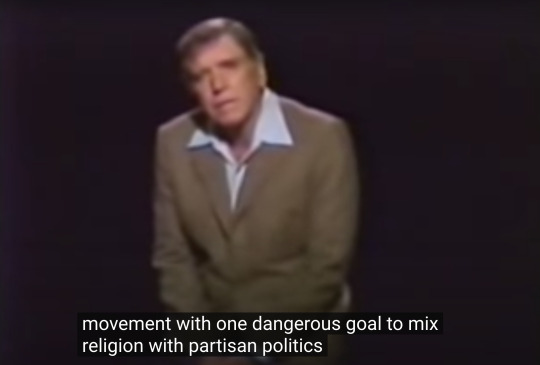
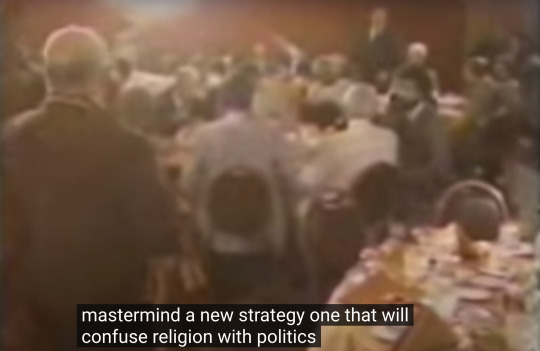
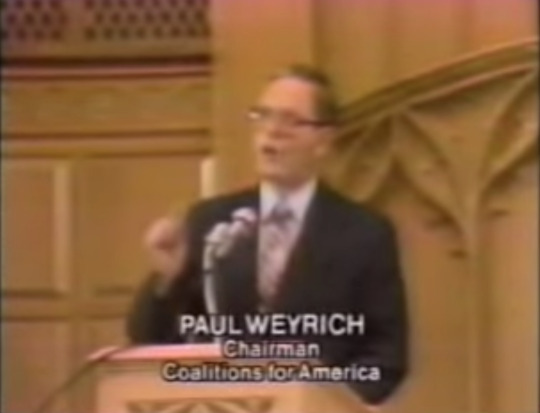
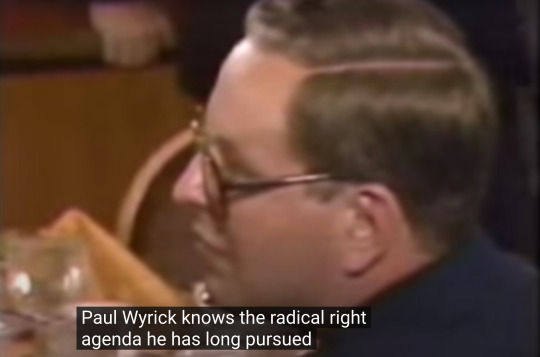
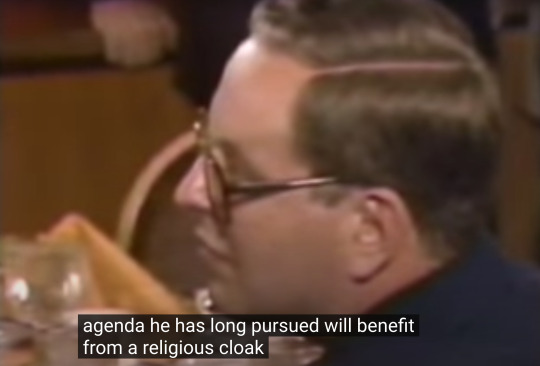
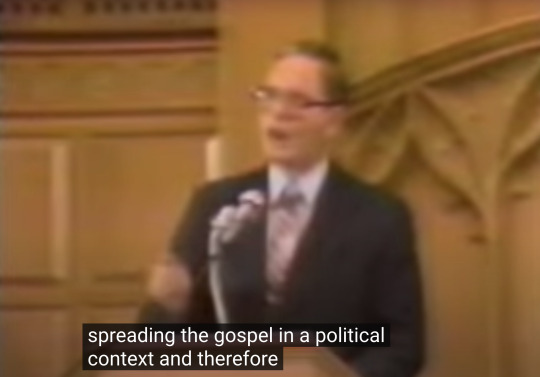





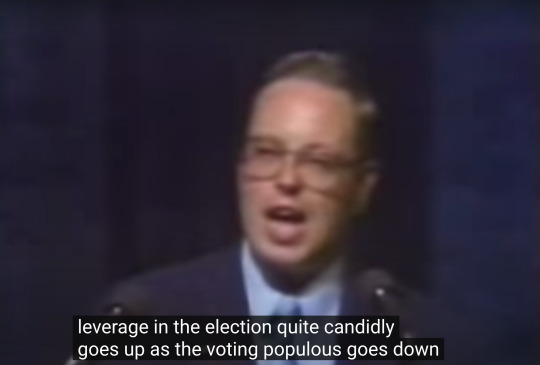
Life and Liberty for All Who Believe (1982) is a documentary produced by Norman Lear's People For the American Way.
It features Burt Lancaster trashing Jerry Falwell, Pat Robertson, and Heritage Foundation founder Paul Weyrich for their extremism and bigotry.
The film chronicled the first massive meeting of the religious right, held in Dallas, Texas in 1980, where Paul Weyrich famously proposed voter suppression as winning tactic for far-right Republicans.
#america#paul weyrich#heritage foundation#think tank#fire and brimstone#historical context#burt lancaster
2K notes
·
View notes
Text
Mark Sumner at Daily Kos:
The large red fingerprints of the Heritage Foundation seem to be everywhere in the news. The group authored Project 2025, which would empty the federal government, populate it with MAGA loyalists, and, in its own words, “deconstruct the administrative state.” As The New Republic puts it, Project 2025 is “a remarkably detailed guide to turning the United States into a fascist’s paradise.” They’re thrilled by the Supreme Court’s recent immunity ruling, deeply involved in attacks on diversity and equity initiatives, and obsessed over strange things like Prince Harry’s visa. And they promise not to kill all leftists—as long as we sit quietly and acquiesce to their dominion over the nation.
The Heritage Foundation so kindly offering to let us have our lives in exchange for our freedom is a malignancy that has festered in the group for decades. Though it benefits from a name and a network of donors stretching back five decades, today’s Heritage Foundation is a much more dangerous beast. It has wealth. It has connections. And it has democracy in its sights. The Heritage Foundation was founded in 1973 by the founder of Coors Brewing and conservative strategists Paul Weyrich and Ed Feulner. They thought that President Richard Nixon had moved too far to the left and that other Republican organizations were too timid. They promoted a strong anti-communist message and a social conservatism that didn’t recognize a wall between church and state, and pushed for a smaller government. The group quickly gained power under President Ronald Reagan, who embraced its “Mandate for Leadership”—a 1,100-page document of policies—and distributed it among his staff. Much of what came to be known as “the Reagan doctrine,” both domestically and internationally, was a repackaging of this product from the Heritage Foundation.
[...] Like many organizations, Heritage has seen turnovers in leadership, staff purges, shifts in philosophy, and difficulties in maintaining its place in a changing political environment. But the Heritage Foundation that exists today is practically a toddler. With a razor blade. This iteration of the Heritage Foundation dates to the pandemic, when the group's previous leader, Kay Coles James, made the mistake of trying to follow safety guidelines, including closing the group’s offices for an extended period and putting up signs that encouraged masking. That led to her replacement by conspiracy theorist Kevin Roberts, who had been on Texas Gov. Greg Abbott's COVID-19 task force and immediately pushed Heritage into suing to stop any vaccine mandate.
The architect of the radical right-wing policy guide Project 2025 is The Heritage Foundation. The organization’s hard MAGA turn began under the leadership of Kevin Roberts.
#The Heritage Foundation#Mandate For Leadership#Project 2025#Donald Trump#Kevin Roberts#Ed Faulner#Paul Weyrich#Kay Coles James#Joseph Coors
33 notes
·
View notes
Text
The Man Who Mobilized The Evangelical Vote | AJ+
youtube
#paul weyrich#donald trump#evangelicals#the religious right#evangelical politics#politics#youtube#aj+
0 notes
Text
Worth Fighting For ...
Sweden, unlike the United States and other more restrictive nations, believes that every person over the age of 18 has a right to vote for the people who will make and carry out the laws of their country. Elections are held on Sunday (the 2nd Sunday in September), and every citizen is automatically enrolled (registered), with proof of registration material sent to the homes of every eligible…
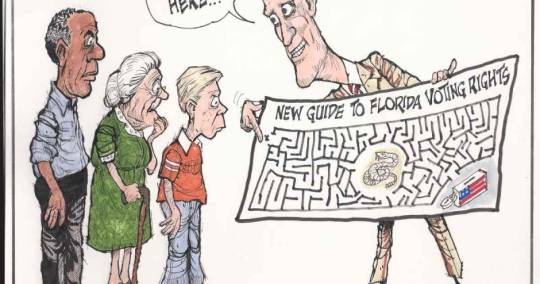
View On WordPress
0 notes
Text
okay this is semi obscure but i will now be listing off my favorite off book episodes that you should absolutely listen to right now
(not in any particular order)
• 277. wine from the hospital floor with addie weyrich
• 165. one two tree with eliza skinner
• 146. bachelor quest with the 2 johnnies
• 118. barn of darkness with paul sabourin
• 87. what's in thrift store with sasheer zamata
• 13. attorney at love with nicole parker
• 4. curses curses curses with jamie denbo
• 283. all black everything with ross bryant
• 229. breadtime: who will survive with rachel bloom
• soap opera! with kelly marie tran
• 224. the other scottish play with katie berry
• 83. night at the natural history museum with janet varney and steve berg
• 247. a single pull up to save the president with peter benifaz
• 209. non stop socks! with lilan bowden
• 275. this book only happens when you read it with rashawn scott
• 270. PMS: perpetual mischief season with gilli nissim
• 196. get haim to the greek with shaun diston
• 189. anything goes: in montana with demi adejuyigbe
• 198. can i compare you to a cheese? with sherry cola
• 177. trashassic trash with nick mandernach
• 161. clear eyes, full hearts with arden myrin
• 114. billionaires and future children with carl tart
• 23. o little town of doggywood with paul f thompkins and nicole parker
• 21. murder on the picturesque express with scott aukerman
• 299. clueless: a paints mcspectrum mystery with scott aukerman
• 102. love island: normal edition with elliot glazer
• 29. reborn in the fire with rachel bloom
248. cowminal house (animal house where the animal is a cow) with brendan dowling
• 88. tacoma valley with douglas widick
• 213. moms, bombs, and dante's gone with laci mosly
• 271. kisses to my critics with tim murray
• 250. intermission! with alice stanley jr
• a seastar is born with jeff hiller
• 80. candy crushin' it with mark mcconville
• 81. sean cullen live at sketchfest
• 99. mirage à trois with lucas hazlett
• 102. the cat five and the bad boys with heather anne campbell and nick wiger
• 73. The Dr & the Beast with D'Arcy Carden
• 74. actually, love with matt rogers
• 291. every place i cry live at permanent records
• 110. keeping pace with pace with the cooties
• 75. a cup of christmas with paul f thompkins and nicole parker
• 66. we object to fear
• 228. mariah who are ya? with matt rogers
• 34. zigging through time with ross bryant
• 96. summer stock: the musical with joel kim booster
• 290. the podcast about a ride about a show about YOU with tony rodiguez
• 6. wolf/tuck:LIVE! with d'arcy carden and paul scheer
• 11. shift your north: LIVE! with griffen newman and michael cruz kayne
• 18. touched by a gabriel with ashley ward
#off book#off book podcast#zach and jess#jess mckenna#jessica mckenna#is this too niche#i'm totally normal about this podcast#hahahahahaha im doing fine#autism
26 notes
·
View notes
Text
“Matthew’s Passion”
By Tony Kushner. Tw for homophobia, homophobic murder, hate crimes.
When Trent Lott heard the news about the murder of Matthew Shepard, the first thoughts that flashed through his mind were all about spin. Trent Lott worried about how to keep his promise to the religious right, to speak out against the homosexual agenda, without seeming to endorse murder. Trent Lott endorses murder, of course; his party endorses murder, his party endorses discrimination against homosexuals and in doing so it endorses the ritual slaughter of homosexuals.
Democracy is a bloody business, demanding blood sacrifice. Every advance American democracy has made toward fulfilling the social contract, toward justice and equality and true liberty, every step forward has required offerings of pain and death. The American people demand this, we need to see the burnt bodies of the four little black girls, or their sad small coffins; we need to see the battered, disfigured face of the beaten housewife; we need to see the gay man literally crucified on a fence. We see the carnage and think, Oh, I guess things are still tough out there, for those people. We daydream a little: What does that feel like, to burn? To have your face smashed by your husband's fist? To be raped? To be dragged behind a truck till your body falls to pieces? To freeze, tied to a fence on the Wyoming prairie, for eighteen hours, with the back of your head staved in? Americans perfected the horror film, let's not kid ourselves: These acts of butchery titillate, we glean the news to savor the unsavory details.
And then, after we've drawn a few skin-prickling breaths of the aromas of torture and agony and madness, we shift a little in our comfortable chairs, a little embarrassed to have caught ourselves in the act of prurient sadism, a little worried that God has seen us also, a little worried that we have lazily misplaced our humanity, a little sad for the victims: Oh, gee, I guess I sort of think that shouldn't happen out there to those people, and something should be done. As long as I don't have to do it.
And having thought as much, having, in fact, been edified, changed a very little bit by the suffering we have seen, our humanity as well as our skin having been pricked, we turn our back on Matthew Shepard's crucifixion and return to our legitimate entertainments. When next the enfranchisement of homosexuals is discussed, Matthew Shepard's name will probably be invoked, and the murder of gay people will be deplored by decent people, straight and gay; and when the religious right shrills viciously about how the murder doesn't matter, as it has been doing since his death, decent people everywhere will find the religious right lacking human kindness, will find these Gary Bauers and Paul Weyrichs and Pat Robertsons un-Christian, repulsive, in fact. And a very minute increment toward decency will have been secured. But poor Matthew Shepard. Jesus, what a price!
Trent Lott endorses murder. He knows that discrimination kills. Pope John Paul II endorses murder. He, too, knows the price of discrimination, having declared anti-Semitism a sin, having just canonized a Jewish-born nun who died in Auschwitz. He knows that discrimination kills. But when the Pope heard the news about Matthew Shepard, he too worried about spin. And so, on the subject of gay-bashing, the Pope and his cardinals and his bishops and priests maintain their cynical political silence. Rigorously denouncing the abuse and murder of homosexuals would be a big sin against spin; denouncing the murder of homosexuals in such a way that it received even one-thousandth of the coverage his and his church's attacks on homosexuals routinely receive, this would be an act of decency the Pope can't afford, for the Pope knows: Behind this one murdered kid stand legions of kids whose lives are scarred by the bigotry this Pope defends as sanctioned by God. None of these kids will ever be allowed to marry the person she or he loves, not while the Pope and his church can prevent it; all of these kids are told, by the Holy Catholic Church, and by the Episcopalians and Lutherans and Baptists and Orthodox Jews: Your love is cursed by God.
To speak out against murdering those who are discriminated against is to speak out against discrimination. To remain silent is to endorse murder.
A lot of people worry these days about the death of civil discourse. The Pope, in his new encyclical, Fides et Ratio (Faith and Reason), laments the death of civil discourse and cites "ancient philosophers who proposed friendship as one of the most appropriate contexts for sound philosophical inquiry." It's more than faintly ludicrous, this plea for friendship coming from the selfsame Pope who has tried so relentlessly to stamp out dissent in churches and Catholic universities, but let's follow the lead of the crazies who killed Matthew Shepard and take the Pope at his word.
Friendship is the proper context for discussion. Fine and good. Take the gun away from the head, Your Holiness, and we can discuss the merits of homosexual sex, of homosexual marriage, of homosexual love, of monogamy versus promiscuity, of lesbian or gay couples raising kids, of condom distribution in the schools, of confidential counseling for teenagers, of sex education that addresses more than abstinence. We can discuss abortion, we can discuss anything you like. Just promise me two things, friend: First, you won't beat my brains out with a pistol butt and leave me to die by the side of the road. Second, if someone else, someone a little less sane than you, feeling entitled to commit these terrible things against me because they understood you a little too literally, or were more willing than you to take your distaste for me and what I do to its most full-blooded conclusion, if someone else does violence against me, friend, won't you please make it your business to make a big public fuss about how badly I was treated? Won't you please make a point, friend, you who call yourself, and who are called, by millions of people, the Vicar on Earth of the very gentle Jesus, won't you please in the name of friendship announce that no one who deliberately inflicts suffering, whether by violence or by prejudice, on another human being, can be said to be acting in God's name? And announce it so that it is very clear that you include homosexuals when you refer to "human beings," and announce it so that the world hears you, really hears you, so that your announcement makes the news, as you are capable of doing when it suits your purposes? Won't you make this your purpose too? And if you won't, if you won't take responsibility for the consequences of your militant promotion of discrimination, won't you excuse me if I think you are not a friend at all but rather a homicidal liar whose claim to spiritual and moral leadership is fatally compromised, is worthnothing more than...well, worth nothing more than the disgusting, opportunistic leadership of Trent Lott.
A lot of people worry these days about the death of civil discourse, and would say that I ought not call the Pope a homicidal liar, nor (to be ecumenical about it) the orthodox rabbinate homicidal liars, nor Trent Lott a disgusting opportunistic hatemonger. But I worry a lot less about the death of civil discourse than I worry about being killed if, visiting the wrong town with my boyfriend, we forget ourselves so much as to betray, at the wrong moment in front of the wrong people, that we love one another. I worry much more about the recent death of the Maine antidiscrimination bill, and about the death of the New York hate crimes bill, which will not pass because it includes sexual orientation. I worry more about the death of civil rights than civil discourse. I worry much more about the irreversible soul-deaths of lesbian, gay, bisexual, transgendered children growing up deliberately, malevolently isolated by the likes of Trent Lott and Newt Gingrich than I worry about the death of civil discourse. I mourn Matthew Shepard's actual death, caused by the unimpeachably civil "we hate the sin, not the sinner" hypocrisy of the religious right, endorsed by the political right, much more than I mourn the lost chance to be civil with someone who does not consider me fully a citizen, nor fully human. I mourn that cruel death more than the chance to be civil with those who sit idly by while theocrats, bullies, panderers and hatemongers, and their crazed murderous children, destroy democracy and our civic life. Civic, not civil, discourse is what matters, and civic discourse mandates the assigning of blame.
If you are lesbian, gay, transgendered, bi, reading this, here's one good place to assign blame: The Human Rights Campaign's appalling, post-Shepard endorsement of Al D'Amato dedicates our resources to the perpetuation of a Republican majority in Congress. The HRC, ostensibly our voice in Washington, is in cahoots with fag-bashers and worse. If you are a heterosexual person, and you are reading this: Yeah yeah yeah, you've heard it all before, but if you have not called your Congressperson to demand passage of a hate crimes bill that includes sexual orientation, and e-mailed every Congressperson, if you have not gotten up out of your comfortable chair to campaign for homosexual and all civil rights--campaign, not just passively support--may you think about this crucified man, and may you support--may you think about this crucified man, and may you mourn, and may you burn with a moral citizen's shame. As one civilized person to another: Matthew Shepard shouldn't have died. We should all burn with shame.
#pride month#homophobia#angels in america#lgbt#lgbtqia#tony kushner#tw for homophobia#let us not forget how hard we have had to fight; in a time where american republics see fit to strip us of it#the words of others
5 notes
·
View notes
Text
I don’t think people realize how dangerous Project 2025 is. I know how dangerous it is because the Heritage Foundation has already succeeded at creating a program to unravel the tattered remains of American democracy; they published a document in 1981 called mandate for leadership, which outlined the policy measures necessary to obliterate the middle class and introduce right-wing zealotry to the United States. Reagan ended up taking 60% of his policies from that document. And it is not hyperbole when we call these people N@zis. Paul Weyrich, one of the founders of the Heritage Foundation, elected Laszlo Pasztor, a convicted war criminal at Nuremberg for crimes related to the Holoc@ust, as ethnic outreach coordinator. From this position he siphoned the rat lines to recruit every single former N@zi he could find to the GOP. This is the reason that the policies pushed by the Republican Party in the last 45 years are eerily similar to the strategies of a certain German dictator. Donald Trump claims he is unaware one of the most dangerous documents ever produced regarding public policy, but if we know one thing about Mussolini Jr. is that he cannot be trusted. His seemingly uncoordinated tactics, more succinctly denoted “dogwhistle politics”, is the apparatus by which he gathers the support and influence of the far-right while maintaining a plausible deniability that allows him to remain popular. It is unbelievably dangerous because it is extremely effective. We cannot allow the scourge of far-right authoritarianism and f@scism to once again entrench itself in the inner workings of the American government.
1 note
·
View note
Photo

Yes, people convicted of felonies in the United States don't have the right to vote (although, I do believe that people convicted of misdemeanors still have the right to vote, but I may be wrong on this). Given that the United States has a federal system, the way things work is different in each state. In some states, people who are no longer imprisoned still don't regain the right to vote. I'm not entirely sure which state is which (except for Florida, where people formerly imprisoned might not regain their right to vote), but it can depend on things such as whether or not someone is on parole, whether or not someone is on probation, etc.
Speaking of Florida, some really fucked shit happened there before the 2020 Presidential Election that I'd argue is the main reason why Trump won Florida in 2020. Hold on, I'm going to quote a research paper about the 2020 Presidential Election that I did for a class. To quote myself, "in Florida, a law was signed that mandated that all former prisoners must pay all of their court debts in order to regain the right to vote. In effect, this was a poll tax that disenfranchised approximately 1 million Floridians. Trump won Florida by 371,686 votes."
"According to the ACLU, 'across the country, 1 in 16 Black Americans cannot vote due to disenfranchisement laws;' 'counties with larger minority populations have fewer polling sites and poll workers per voter;' 'in 2018, Latinx and Black Americans were twice as likely as whites to be unable to get off work while polls were open;' and 'geographic isolation is a major barrier to Native American voters due to the inaccessibility of nearby polling locations in many reservations. In South Dakota, 32 percent of Native voters cite travel distance as a factor in deciding whether to vote.'"
To illustrate my point as best as I can, I am going to quote Paul Weyrich, the co-founder of the right-wing Heritage Foundation. "[He doesn't] want everybody to vote. Elections are not won by a majority of the people. They never have been from the beginning of our country and they are not now. As a matter of fact, [the Republican Party’s] leverage in the elections quite candidly goes up as the voting populace goes down."
This ties into why these restrictions on voting exist: if you have a party that doesn't have a majority of support from most, if not all minority groups, and you want to win elections at all costs, you will do anything in your power to prevent those people from voting. You could enforce laws more harshly, create laws that disproportionately target them, you could redraw legislative districts to limit the power that they have (while racial gerrymandering is de jure illegal in America, partisan gerrymandering crucially isn't in most states), you would imprison them at a much higher rate to prevent them from voting if inmates can't vote, etc.

239K notes
·
View notes
Text


Reverend Don Wildmon was a longtime member of Paul Weyrich's influential Council for National Policy. He ran aggressive campaigns against "immoral" showbiz including Three's Company, Martin Scorsese, The New Adventures of Mighty Mouse, and ALF. His son Tim Wildmon has followed in his father's tradition, running an organization called the American Family Association, which argues that "political correctness" and "hate crime laws" are "threatening the Christians' existence."
263 notes
·
View notes
Text
Worth Fighting For … | Filosofa's Word
Perhaps the most egregious statement about voter suppression was this, from Moral Majority leader and co-founder of the Heritage Foundation, Paul Weyrich … “I don’t want everybody to vote. Elections are not won by a majority of people, they never have been from the beginning of our country and they are not now. As a matter of fact, our leverage in the elections quite candidly goes up as the…

View On WordPress
0 notes
Text
youtube
The conservative playbook is still the same. 👀
#paul weyrich#politics#voting#conservatives#conservative christians#voter rights#voting rights#Youtube
0 notes
Text
From Then To Now ... The Path To Today
Ever wonder how today’s GOP strayed so far from the original “Party of Lincoln”? It didn’t happen overnight, wasn’t the result of just one incident or Supreme Court Ruling, but a series of events starting back in 1964. Political analyst Thom Hartmann tells the story and it is one that is definitely worth your time and effort to read … it was an eye-opener for me. “How Come Everything the…
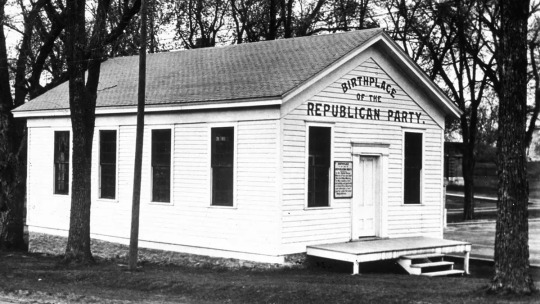
View On WordPress
#Civil Rights Act of 1964#evangelical movement#George H.W. Bush#Jerry Falwell and Paul Weyrich#President Lyndon B. Johnson#Ronald Reagan#Thom Hartmann
0 notes
Text
MY COUNTRY, 'TIS OF THEOCRACY
Now playing at Harkins Shea:
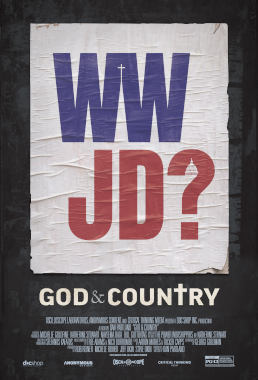
God & Country--Produced by Rob and Michele Reiner and directed by Dan Partland, this documentary about Christian Nationalism in American politics is impassioned but lucid and not hysterical. Based on Katharine Stewart's book The Power Worshippers: Inside the Dangerous Rise of Religious Nationalism, the movie is presented as a warning to secular or non-evangelical citizens for whom the propaganda and political agenda of that movement may be largely invisible.
The talking heads here are mostly Christians themselves, ranging from Russell Moore to Reza Aslan to Jemar Tisby to Kristin Kobes du Mez to Sister Simone Campbell to Bishop William J. Barber II to Veggie Tales co-creator Phil Vischer. They speak calmly, even a little sheepishly, but firmly and with an indisputable insider's perspective, and their message is: Christian Nationalism isn't about religious practice; it's about amassing political power.
It's not exactly breaking news when we're informed that Christian Nationalists are terrified of and enraged by feminism, LGBTQ rights, secular education, uncensored libraries and abortion rights, or that the movement is historically connected to racism and segregation. But too many people may not grasp the degree to which Christian Nationalism's ultimate aim is a non-democratic, Christian-supremacist America, and the startling degree to which it's making progress.
In support of this, Partland shows us copious clips of wild-eyed rants by Evangelical heavy hitters stating these aims in no uncertain terms. A comedic highlight comes when, in the midst of one of the movie's many montages of preachers bleating and screeching, we see Robert Jeffress say, with a straight face, "We cannot be silent any longer!"
Partland also works to debunk some of Christian Nationalism's favorite falsehoods, notably that America was intended by the Founders as a "Christian Nation" or that the Separation of Church and State is not found in the Constitution. Attorney and author Andrew Seidel observes here that true religious freedom is impossible without Separation of Church and State.
By way of emphasizing its urgency, the movie also notes that Christian Nationalists were central agents of the January 6 Insurrection, despite the irony of President 45 as the object of their veneration. "When I was a young Evangelical minister," notes Faith and Action founder Rob Schenck, "we used Donald Trump as a sermon illustration for everything a Christian should not be."
God & Country shares a twofold difficulty with many other worthy progressive political documentaries. First, though well-organized and smoothly edited, it's full of unavoidable footage of the likes of Ralph Reed, Jerry Falwell, Paul Weyrich, Greg Locke, Pat Robertson, Jim Bakker, Kenneth Copeland and Paula White, not to mention 45 himself, that can be painful for many of us to watch no matter how necessary. Secondly, many of the people who most need to see this movie probably won't watch it. To employ a more than usually apt cliché, it's preaching to the choir.
0 notes
Text
Oh, hey, look at that:
youtube
This video starts off with so much of my favorite exemplar villain. And goes on to many of my other favorites. But, to remind everyone, this video I trot out every election season is also Paul Weyrich.
youtube
Man, he was something, wasn't he.
youtube
He is so very "concerned," not for the people whose human rights we ARE violating but for what could happen if the mess he created got turned around on him. Basically, he didn't want what Bush was doing (and Donald Trump is currently promising to do) unless it is a lock that a Republican is doing it. And he knew it wasn't a lock.
What a villain.
But it is really worth emphasizing that although Weyrich is dead, he died in 2008, his vision of minority authoritarian pro-business, pro-Christian control is very much alive and well.
The excellent Heritage Foundation video at the top mentions the talking points memo that goes out to everyone.
This is no joke.
It's the underlying reason you see stuff like:
youtube
Sinclair botched this one and got caught. Because it was too long a script and too easy to trace.
But if you've ever noticed that all of the sudden, everyone on the right is using the same buzzwords on the same topics, they come from these think tank memos. If you're on the list, you just get a memo.
I had a friend who was, for a little while, on the list. He got a DAILY memo. Every day they sent him the talking points memo. And he could read along as he watched the newscasts. The talking points were all generally the same. Again, they're usually much smarter than the Sinclair message, it's usually no more than a sentence or two and mostly emphasizes HOW to say things, what words to use for certain concepts.
The memos are very short. And at the end of each memo, it references another memo.
So the Daily Memo was about a page. Easy enough to read, reference and memorize. And if you need more information, go read the Weekly Memo again.
And if you need more than the Weekly Memo provides, go read the Monthly memo.
If there's a big emergency, a memo of the moment will get sent to you and mention reading the Daily Memo for more information.
The information age has given the Republicans the perfect way to hide the connection between the body of itself and the many heads of the hydra. It's all in private email lists. I'd bet good money they've even done it better now and it's all on Discord servers with the page rigged so you can't right click and print screen and they can know exactly who can sign on.
Because they don't JUST send this stuff out. You have to know someone. You had to know someone on the list to sign you up for the list. That's how my friend got on it while he was on it. And there's some kind of renewal system which we don't know, so people get kicked off to prevent leaks. Because the last thing you want is some kind of mashup like the Sinclair crapshow. It is absolutely meant for the faithful and the powerful.
Do they believe this stuff?
Some do. Some don't. It doesn't matter. Because they say it. And they walk people through it.
That's a big part of Fox news' power. There are literally hundreds of millions of dollars per year for smart people just to sit around and try to think up how to convince people how to think the way the Think Tanks want people to think. They send their ideas out and that gets made into the memo. And it gets passed to everyone who matters. Every day. More if necessary.
And Fox News obeys the memo. Not reading it like the Sinclair message. Again, that was a botch. Nope, it starts off in the morning with somebody mentioning that "some people" are saying X. Around lunch time they start asking, hey, what do you talking heads think about X that some people are saying. In the afternoon, it's look, so many people are thinking X, we have to take it seriously. Then it gets to later shows with the big guns who bellow about how YOU should think X. The next day, assuming the message doesn't get overwritten, the morning show statement that some people are saying X is actually true this time, because YOU are now saying it because of the messaging from the day before.
No one it totally immune to this cycle. This is the Overton window in action. It is legitimizing a stance by moving it from non-existence to a standardized take in nothing flat. It's taking viewers from here's an idea, here's support for the idea without a push except to acknowledge that the idea exists, here's an "authoritative" support for the idea (and while they've generally cut it now, they used to also get the worst believable person they could find to support the counter argument so opposition would gain the air of stupidity against the talking head who was good at defending a thesis they had been practicing for hours). Then they push an appeal to the masses, go along with everyone. And finally they make an appeal for you to act - think this way we want you to. Which is only made after a whole slew of arguments, framed the best way money can buy brains to frame it, to convince you. So, it's darn effective.
Lots of sources no longer definitively means lots of INDEPENDENT sources. The GOP and Heritage Foundation are pioneers in abusing that loophole.
And, yes, that IS why you have to vote. That is why it is important to make statements against Republican stances. That is why it is important to poke holes in that logic. Because there is a huge force of money, power, and influence behind their message. And that is a problem.
Not just for liberals, democrats, and/or anti-Republicans. It is, as the Sinclair mashup pounds home, a threat to American democracy because it is lots of disparate tiny voices trying to argue with a giant well oiled messaging machine. It is an entire gargantuan system meant to move the country against its better judgement and will to a self harming position.
Is there some massive deep conspiracy to steal the next election?
It depends on how you define conspiracy.
If you define it like thieves all connected and colluding together for a giant heist like an Ocean's 11 movie. No. That's not happening.
If you define it like stochastic terrorism where Trump just mentions how a certain people are bad and suddenly, for some apparently random reason, hate crimes against those people spike. But it's all people that not only don't know Trump, they don't know anyone who knows anyone who knows Trump. They were just "inspired" by him to actually act the way he wanted but only talked about and never did or told them to do himself.
Then, yes. They are absolutely doing that and making damn sure that their voice carries in such a way that everyone who could possibly benefit their goal by acting hears the passive aggressive order to do so. They spread the message daily. Literally. More if they have to.
Our world is not an accident. It is the result of decades of relentless and profoundly difficult work being done by people who are good at that job, even if they're idiots in every other way.
And if that is not the world you want, then, yeah, you have to put some kind of effort into opposing them.
It's also worth noting, in spite of the negative tone, that there is work and effort happening. There is more push than there has ever been and it is getting stronger to match their work. So it's also time to keep hope.
We absolutely CAN stop them.
We absolutely CAN undo the damage they've done.
It's just going to take DECADES. The same as it took them.
You don't have to finish the work. Better: it isn't possible to finish the work. AND you still have to do it. Because the work has to be done. There will be no miracle. There will be no great savior to ride in and fix it all. It's just a lot of steady hard work. Which isn't fun but has the benefit of being something we can all do. And we can all pick up the slack from each other. We don't have to be the great savior with a miracle at hand. All we have to do is work as much as we are safely able to do and then pick it up again. Slow and steady. Every time.
Remember, 70% of the US voting population is not Republican and doesn't like their policies.
70%.
We are the majority in that regard. Not a tiny majority. The real majority. And if the majority of us agree that we don't want Paul Weyrich's America enough that we all show up, all this scheming is going to be nothing but a Trump speech. A lot of bloviating, braggadocio, hot air, and bullshit that, in the end, does absolutely nothing.
But agreement is necessary. You have to pick a side and mean it. You've got to decide that it is more important to vote for the possibility of a different world than to give up hope that this world is awful.
Vote.
And vote in the way that will make sure Republicans can't win.
That's it. Those are the choices in the non-ideal world we live in.
1 note
·
View note
Text
Don’t Drink Coors!
Once upon a time a community decided that it wasn't going to purchase a certain brand of beer any longer because it was clear that the brewers were blatantly participating in the oppression and suffocation of that community.
The company suffered great losses.
Ten years later, that same community found itself in the midst of an overwhelming health crisis in which tens of thousands died — directly due to governmental neglect induced by the very same hatred those brewers and their kind espoused. Then came the company's glossy, Hollywood p.r. campaign.
Recently an Out Week reporter ordered a beer at the Village gay bar Julius' and was promptly served a Coors. God's Love We Deliver, AmFar, the Gay Rodeo, Lambda Awards of Philadelphia and Northern Lights are among a handful of AIDS and/or gay and lesbian organizations which have of late had Coors sponsor fundraising events or have accepted direct contributions from the company. The national gay news magazine, The Advocate, has recently begun accepting advertising from Coors, as have Long Island's Equal Times and Wilde Side and Los Angeles' Frontiers. Equal Times has decided, as it recently stated, that the Coors boycott is over. So has God's Love We Deliver's Buddy Noro.
Since when do a few people in the community suddenly decide what's right fqr the entire community? How can anyone say the Coors boycott is over simply because he or she has decided to take money from the company, accepting Coors' claims about how the company is now different? And why do those individuals taking the money consistently tell us that Coors has changed while there is overwhelming evidence pointing in the other direction?
A recent OutWeek investigation (issue 2, July 3, 1989) of the Coors Foundations' 1987–88 tax return reveals a $100,000 donation to the Heritage Foundation, a right-wing "think tank"; $150,000 to the Free Congress Research and Education Foundation, led by Reagan advisor Paul Weyrich; $80,000 to the Christian Broadcasting Network University, run by televangelist Pat Robertson; $25,000 to the Rocky Mountain Billy Graham Crusade; $20,000 to Morality in Media and $50,000 to the Ronald Reagan Presidential Foundation.
"That's only the beginning," says Chip Berlet, who studies the far-right as a researcher for Political Research Associates in Cambridge. "Much of [the Coors] family money goes to neo-nazi groups funneled through front organizations. They still have a reactionary, even white supremacist view of America. Every beer bought is like buying a gun for these people."
And for every charity dollar accepted from Coors, 100 dollars goes toward killing us. Don't believe the hype. Keep the boycott alive...
— Editorial, OutWeek Magazine No. 5, July 24, 1989, p. 4.
#outweek#issue 5#lgbt history#homophobia#coors#julius'#the advocate#billy graham#paul weyrich#editorial#heritage foundation#equal times#wilde side#frontiers#free congress research and education foundation#amfar#god's love we deliver#buddy noro#northern lights#lambda awards of philadelphia#boycott
5 notes
·
View notes
Text


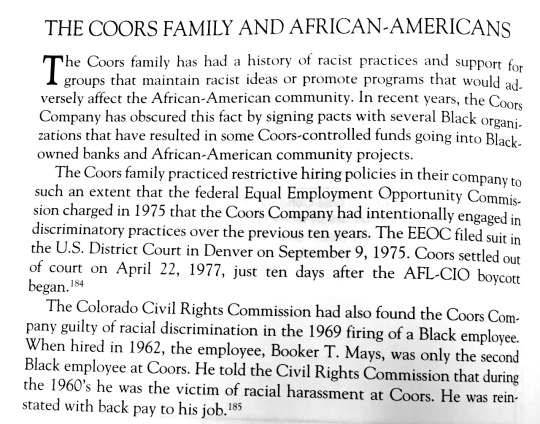

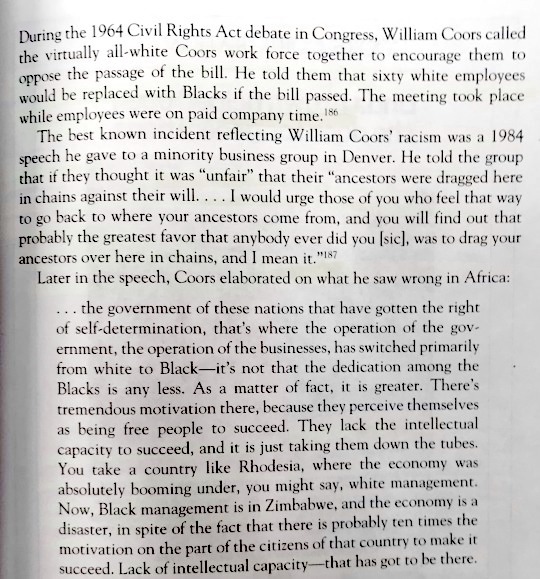

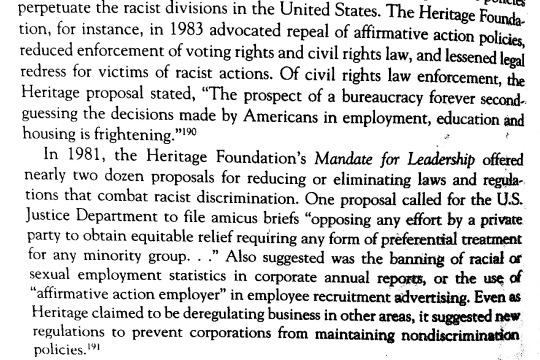

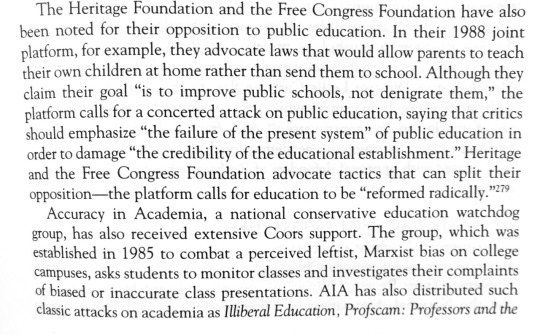


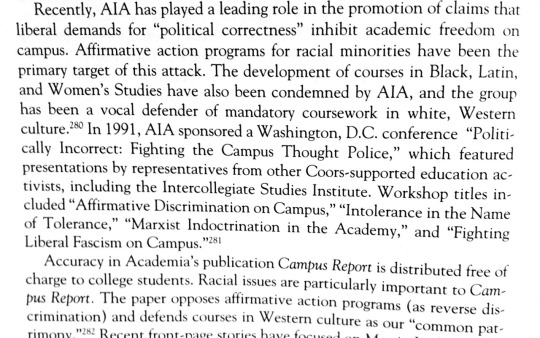
Coors Beer has had a long record of anti-Black discrimination. The company was steadfastly opposed to the Civil Rights Movement in the 1960s. They were connected to racist extremists throughout their history.
In 1973, Coors provided the money that started the Heritage Foundation. The intention of the Heritage Foundation was to bring anti-Civil Rights, anti-Affirmative Action, and anti-Black concepts into the mainstream by pretending to be scholarly.
Over the years they have expanded their goals to oppose public education, health care, and women's rights.
The Heritage Foundation has probably been the most influential think tank and propaganda outfit of the last 50 years despite pushing policy ideas that are extremely unpopular with the majority of the population.
#heritage foundation#think tank#corporations#civil rights era#affirmative action#america#historical context#paul weyrich
144 notes
·
View notes